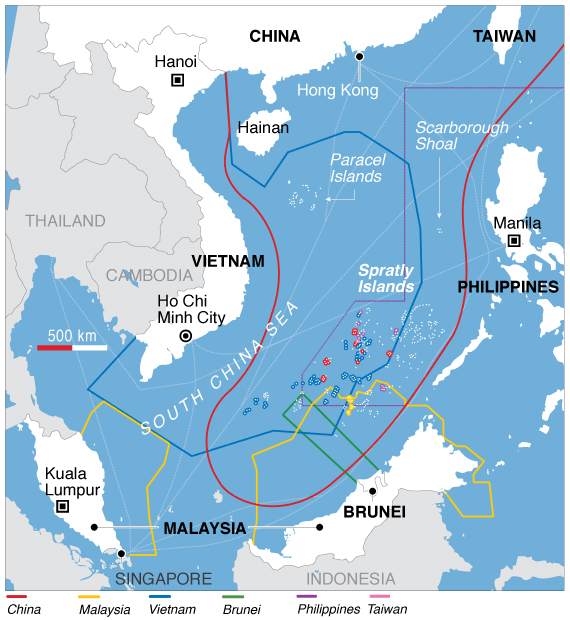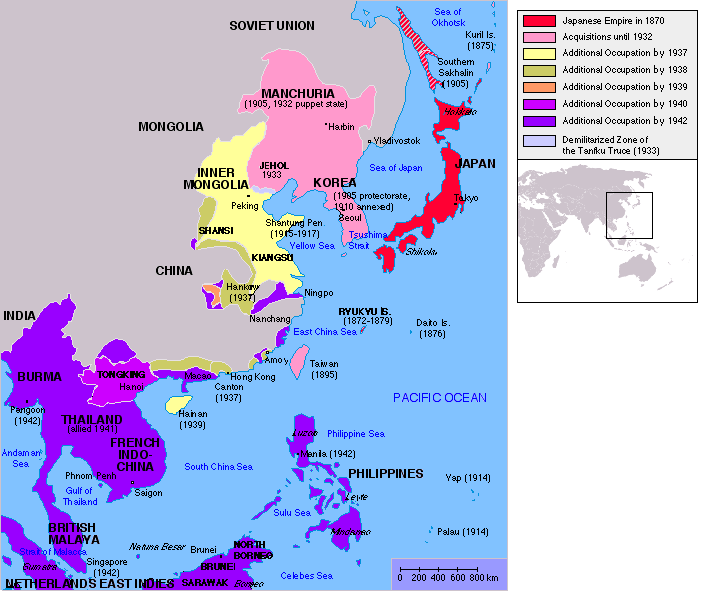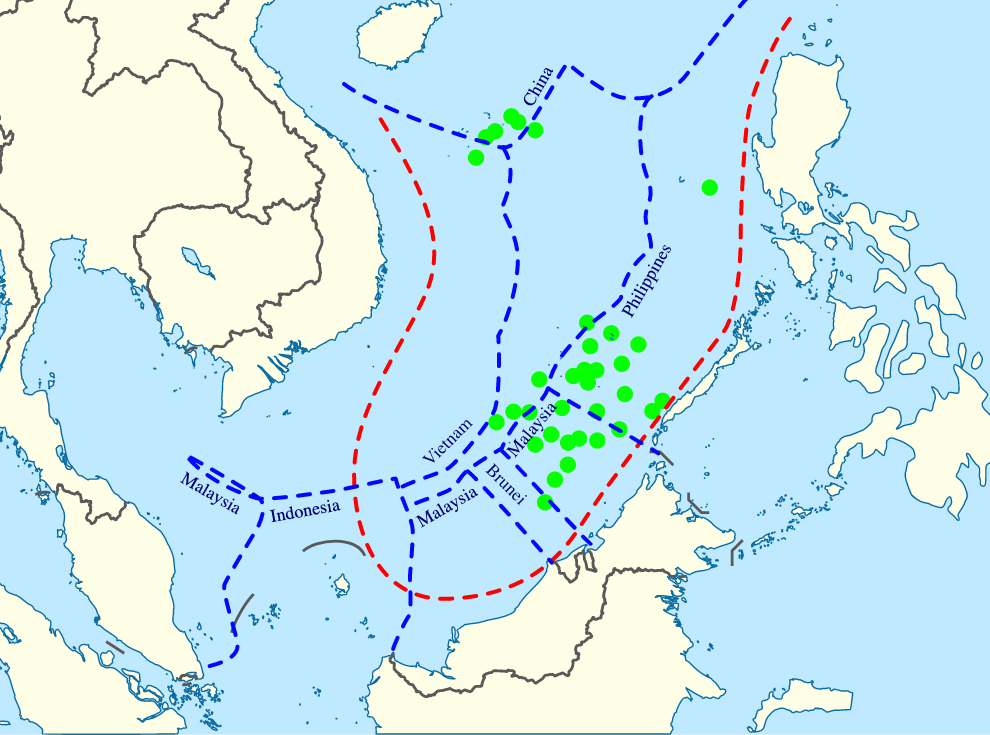Tom Au has offered a solid answer about the narrow view regarding colonial claims, but those are in 2016 mostly irrelevant. What is more relevant are claims, current and future, made under the current protocols for territorial waters of UN members and exclusive economic zones. This informs the rights to resources in seas and continental shelves. (ILOS is all about that). That makes this answer a bit of a frame challenge. You may as well ask about the American "colonial legacy" in German and Italy, where we still have bases. Wait a minute: there isn't one.
Realpolitik, not colonial anything
Your hand wave of some of the core issues involved in the South China Sea, and the attempt to replace them with some "real reason" are done for your own reasons. But they miss the point of what the world is in 2016.
Clinton and Trump are making noise to feed two audiences:
Domestic: it's all hot air from the both of them
International: the nations with whom America has been working
on this issue since the early 1990's are being assured "we still care
about you and your problem with your big neighbor."
The core American interests in the post-colonial era -- which is anchored in the founding of the UN and the emergence of so many new nation states -- remain trade and the ability to have some influence in regions all over the world. America is engaged globally because it trades globally. (America's experiment as a colonial power was fairly brief -- late 1890's to the end of WW II).
While China was in the Cold War era an ideological and political rival to America, since the early 1990's that inter-power rivalry has changed to include an increasingly commercial character. (For some background on how the US became a power, and its role in the late 20th century as a hegemon, I recommend Walter Russell Meade's "Special Providence." Short answer: international trade has been a core national interest since the US was a colony of the English Crown. That has not changed, and has increased in importance over time).
Why is the "colonial" tag irrelevant? Because the year is 2016. In the generation after the UN was founded (from about 1945 to about 1975) dozens and dozens of previous colonies emerged as nation states in their own rights, and as UN members. (As you note, the Philippines in 1946). Of course, this didn't happen in a vacuum.
Relationships with previous colonial powers sustained to one degree or another -- such as in Francophone West Africa or among Commonwealth nations -- but in some cases underwent profound changes like the French/Viet Nam relationship, or how Angola and Mozambique profoundly broke with the Portuguese as much as the Portuguese broke with them. After President Aquino's government invited the Americans to leave in 1991, and after the bases closed, the relationship changed in character from blatantly "paternalistic" to "someone we've had a relationship with for a long time." The Philippines are but one player in the SCS resource issue. You are better off viewing the issue from the PoV of the local nations: Malaysia, Indonesia, Viet Nam, Philippines, Brunei, etc. What are their interests, and how do they pursue them? For whatever reason, you have chosen to try and see this through a US centric lens.
What are the core interests of the US in the South China Sea?
- Trading relationships with all nations in the region
- Freedom of navigation (and how that enables commerce)
- Access for development (usually joint) to resources
- A mixed bag of bilateral security agreements.
Those bilateral agreements are entered into with an eye toward the reality that China is The Major Regional Power. As with Central America vis a vis the Americans in the 19th and 20th centuries, the small and medium sized nations in this region are wary of being overwhelmed or pushed around by the local Power. (Heck, look at what the Japanese managed to do in mid-20th century!) These nations can shop around for big / strong friends (or friends of convenience) as a counterbalance. That isn't a colonial legacy, it's realpolitik in action. (To badly quote Otto von Bismarck on power's balance: When there are five powers, make sure we are on the side with three, not the side with two).
For their own reasons, the local nations have chosen the Americans as a big / strong friend since this dispute has some far reaching impacts into the future. (You could argue that an advantage the Philippines has is that they know the US very well, and know what buttons to push and what traps not to fall into).
The Spratly Islands emerged as a regional "problem" as the potential for resource exploitation ran into the exam question: "Whose turf is this?"
Does the US have an interest? Yes.
Politically and strategically (from a US point of view) if the SCS becomes a resource node for petroleum/energy, that reduces the importance of the Persian Gulf and spreads out risk. SCS resources being controlled and developed by numerous nations is a preferable situation to One Big Dog in the SCS oil patch (See Saudi Arabia as a model for the latter case). It also spreads the wealth, which tends to encourage trade. America has discovered to its chagrin (see 1973 oil embargo) that it is in America's interest for there not to be One Big Dog in a major oil/energy node.
America has chosen to back the ASEAN position rather than get into bed with One Big Dog -- with whom we have massive commercial connections. America could have chosen to back the Chinese. Why not? Residual Cold War antipathy, as well as commercial rivalry, but from a strategic perspective, it's a lot more "balance of power" and support for the variety of allies/friends who are worried about that One Big Dog. That includes Japan, who does not have skin in the SCS game.
About Energy and Natural Resources: as you saw with Iraq in 1990/1991, anything that influences the flow of commerce and energy is of interest to every major commercial nation. (The 20th - 21st century global economy is built on energy, see Daniel Yergin's The Prize for a good treatment of that). It wasn't just America who cared. Japan provided cash to support that operation. The Saudis provided billions in out of pocket support.
I Claim This Rock! (why do they do this?)
Lately, the Chinese look to be doing in SCS what the Greeks and Turks have done in the Eastern Mediterranean and Aegean for decades. If you put your flag on a rock in a coastal area/continental shelf within 12 or 200 miles of your coast, do you get to claim everything within 12 miles of that rock? Within 200, is it all yours for economic purposes? Every few years, in the island and rock filled Aegean Sea, the Greeks and the Turks get into chest thumping exercises over which rock is whose and who just committed an airspace violation near X rock. It usually gets sorted out via a government to government contact, but the big noise is made for political reasons, foreign and domestic. There are other motives, and in the SCS it looks to be money.
The Chinese aren't the only ones who do this. Since they are a Regional Power and the rest are not they are more likely to get away with it. The Americans do not see this imbalance as in their national, global interest.
(From the link)
1930s France first occupied various Spratly islands.
1934-1944 During WWII, Japan displaced the French and occupied the Spratly Islands, using the islands as a submarine base. After the war, neither the French nor the Japanese returned to the islands.
1946 Kuomintang forces took possession of the Itu Aba island -- the largest Spratly island.
1968 The Philippines take control of 3 islands.
1973 South Vietnam possessed 5 islands in the Spratlys
1974 China disregards territorial claims by South Vietnam, and occupies the Paracel Islands lying north of the Spratly Islands. U.S. and South Vietnam naval forces clash over island ownership.
1978 The Philippines extend an official claim to islands east of the Spratlys, naming them the Freedom Islands. China removes 6 Spratly atolls from Vietnam's possession.
1979 Malaysia claims its first Spratly island, indicating that the island is part of Malaysia's continental shelf.
1988 China and Vietnam become military engaged over Johnson Reef. China retains occupation of the reef. By April, Vietnam expands claims to include 15
additional reefs. China occupies 6 isles.
1989 International outrage at the Tiananmen Square incident in China calmed China's aggression in the South China Sea, in an attempt to further avoid infuriating international opinion.
1992 The Manila declaration was drafted and claimants agreed to peaceful resolution of the disputes.
1992 On 25 February 1992, China passed the "Territorial Sea and Contiguous Zones" Law, laying claim to all Spratly islands, as well as several other
archipelagos.
Issue: Exclusive Economic Zone (EEZ), which extends 200 nautical miles from the country's coastline. What's at stake in the SCS and its resource zones is money, and future energy revenue. From a survey in the mid 90's ...
Oil and natural gas reserves in the Spratly region are estimated at
17.7 billion tons; Kuwait's reserves amount to 13 billion tons. The Spratly reserves place it as the fourth largest reserve bed worldwide.
More recent estimates
- The most optimistic estimate suggests that potential oil resources
(not
proved reserves) of the Spratly and Paracel Islands could be as high
as 105 billion barrels of oil, and that the total for the South China
Sea could be as high as 213 billion barrels. A common rule-of-thumb
for such frontier areas as the Spratly Islands Sea is that perhaps 10%
of the potential resources can be economically recovered. Even using
this rule, Chinese estimates imply potential production levels for the
Spratly Islands of 1.9 million barrels/day.
- The USGS has placed the sum total of discovered reserves and
undiscovered resources in the offshore basins of the South China Sea
at 266 Tcf.
As deep drilling tech improves, the recoverable reserves may increase. Or not.
- Who has the rights to drill where?
- Who can preclude others from drilling where?
- How big a slice of this revenue pie does anyone get?
Territorial waters were once "three miles from the coast" but were later extended to "twelve miles from the coast." This started with the Russians in about 1960, and over time has become the internationally recognized standard.
Since the 1970's, an ongoing effort has been underway regarding who has rights on continental shelves. This has led to the 200 nautical mile economic zones. Some of this relates to fishing rights and freedom of navigation, but as tech has improved this gets to mineral rights. (See the International Law of the Sea Treaty and its halting progress over the years in the ILOS link in the introduction).
Where zones overlap, nations are expected to meet and agree on the boundary between them. Colonial legacy? Irrelevant to the current and future issue in the SCS.
What is at issue is commercial competition for resources among a variety of players, China and ASEAN foremost. How long (Philippines) or how recent (Viet Nam) a relationship with the Americans has run may seem to be of interest if your look through a very narrow field of view at the US. The Americans are supporting actors, not stars in this film. Current concerns overwrite "historical" concerns, and in this case future concerns overwrite them with heavier ink. Fifty years ago, Malaysia was just emerging from the British sphere of influence. The US has a relationship with them now as a nation. Likewise with Indonesia, regardless of the Dutch influence from centuries past. None of that history informs why Malaysia and Indonesia have a relationship with the US now. They have present and future issues to address.
The past isn't what matters.
The future matters to all of the players in this game.
The core American interest is in a local power balance and in commerce.
====================================================================
Note: having produced a small mountain of staff work, research and correspondence on this region in the early and mid 1990's, and a couple of brief papers at staff college (my forecasts were some right and some wrong on how our relationship with Viet Nam was going to evolve) I have found that things have changed slowly but inexorably toward a very predictable confrontation. What I guessed wrong, badly, was in how late it would be before American policy makers would accept the seriousness of China as a rival. Obama's "pivot toward Asia" is, from where I saw it then, about 12-15 years late).


